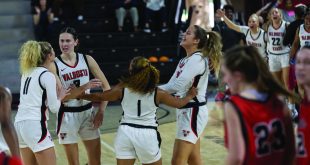It’s outstanding to witness students speaking up for themselves and their peers. For that, I applaud the SGA. In response to their resolution and recent articles in The Spectator, the Office of Social Equity (OSE) would like to provide pertinent information regarding meeting the needs of students from diverse backgrounds.
The disparity between representation of both faculty and students from diverse backgrounds was mentioned. Although the OSE recognizes that the concept of cultural diversity encompasses many dimensions of difference, the major concern of the SGA focuses on the needs of students from diverse racial backgrounds.
This leads to the faculty hiring process and the need to recruit diverse faculty. Even during the most ideal hiring situation, faculty recruitment is complex and involves many administrative and academic units.
Some students assume there are tons of applicants from diverse backgrounds with doctoral degrees in the applicant pool and search committees are turning them away. This isn’t the reality. For varying reasons, individuals from underrepresented backgrounds tend not to pursue and complete doctoral degrees in the same numbers as their majority counterparts.
Other factors in the faculty recruitment process include: salaries, course workload and the appeal of an institution’s geographical location. As a result, VSU often loses candidates to institutions that can offer higher salaries or a more ideal location. This is a national issue not unique to VSU.
Some institutions seeking to better diversify faculty identify potential faculty among their student body/alumni population and encourage them to complete the training needed to return to their alma mater as faculty. This is referred to as a “grow your own” faculty program.
Participants tend to have a greater investment in the success of their alma mater and agree to serve as faculty despite any perceived disadvantages. The draft of VSU’s Institutional Diversity Planincludes a “grow your own” program. The plan was presented to SGA President Jimerson during fall semester for his feedback and suggestions, and approved this week by the SGA.
Also mentioned was the need to separate the OSE and hire new staff in the Student Affairs Division to assist students from diverse backgrounds. The OSE is currently staffed with two individuals and is charged with time sensitive and intensive duties with confidential information that cannot be delegated to student employees, currently our only other form of assistance.
Adgie’s article stated the OSE has five employees. This is inaccurate. Three of those five employees are fully funded by a federal grant, and regulations mandate that those employees only work on grant-related activities. When compared to the number of staff in a similar office at another institution within the USG, our office is severely understaffed.
If additional positions are created, it would be logical to assign them to the OSE so services can be expanded and carried out in a more efficient manner. It would also be logical to follow the action steps and timeline listed in theInstitutional Diversity Plan which includes goals to create centers for underrepresented students.
Again, I applaud the SGA. At the same time, I encourage all who are truly concerned about achieving diversity on our campus to get an understanding of what the OSE’s specific responsibilities are, policies we must observe, and the processes involved.
With that understanding, perhaps we can move forward together. Unfortunately, there is no single remedy that will completely solve the issues expressed. There must be, however, a genuine desire within the hearts of men and women−at all academic and administrative levels of our institution−to see an improved campus culture and community.
Maggie Viverette, Ed.D.
Director of the OSE
 The Spectator The independent student newspaper of Valdosta State University
The Spectator The independent student newspaper of Valdosta State University






